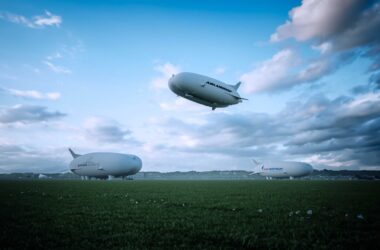In a recent milestone for Project FRESSON, Reaction Engines’ collaboration with Cranfield Aerospace Solutions (CAeS) to achieve zero-carbon flight, their innovative radiator has successfully passed vibration and shock tests. This achievement proves the radiator meets the requirements to operate safely, paving the way for further ground and flight testing.
Project FRESSON, launched in 2021 with funding from the Aerospace Technology Institute, aims to integrate hydrogen fuel cell technology into a nine-seater Britten Norman Islander aircraft. The project addresses thermal management as a critical obstacle in the journey toward hydrogen-electric flight.
Andrew Roseman, senior systems and test engineer at Reaction Engines, emphasized the importance of this milestone: “This period of testing is the culmination of a lot of work for the project team in the design and manufacture of the unit. Getting the hardware tested and showing it meets the customer requirements is a big step forward for the project.”
In traditional, combustion-based aircraft powertrains, waste heat is primarily dissipated through the high-temperature exhaust gases produced by the engine. However, hydrogen fuel cells generate significant amounts of low-grade heat that must be removed from the stack. Using conventional methods for this heat rejection would result in large, heavy heat exchangers, compromising aircraft range and performance.
What is Project FRESSON?
Project FRESSON is a collaborative effort led by Cranfield Aerospace Solutions (CAeS) to develop a zero-emissions propulsion system for the Britten-Norman BN-2 Islander aircraft. The project, named after Scottish pioneer aviator Ted Fresson, aims to convert the widely used Islander into a hydrogen-electric powered aircraft.
Initially launched in October 2019 as a hybrid-electric propulsion project, Project FRESSON later shifted its focus to hydrogen fuel cells in March 2021. The decision to switch from batteries or range extenders to hydrogen was driven by the need for a more viable power source that could deliver the required endurance and range.
The project brings together a consortium of UK-based partners, including Britten-Norman, Ricardo plc for fuel cell integration, Innovatus Technologies for composite hydrogen fuel tanks, and most recently, Evolito as the motor and inverter supplier. Rolls-Royce plc was initially part of the consortium but later departed from the project.
Project FRESSON targets a 60-minute endurance plus 30-minute reserves for the converted Islander, with an estimated range of 100-135 nautical miles. The use of hydrogen fuel is expected to result in significant cost savings compared to fossil fuels, along with reduced maintenance costs for the propulsion system and the aircraft as a whole.
The project showcases UK innovation in the aviation industry and aims to demonstrate the feasibility of zero-emissions flight for short-haul routes, such as those served by the Islander. As of April 2023, the first flight of the hydrogen-powered Islander demonstrator had not yet taken place, with Evolito’s selection as the motor and inverter supplier being the latest milestone in the project’s progress.
Project FRESSON embraces an iterative collaboration model between CAeS and Reaction Engines, ensuring that each component is optimized within the context of the overall system design. This holistic approach fosters a comprehensive solution to thermal management.
Titilope Aigoro, senior airworthiness and certification engineer at CAeS, highlighted the collaborative nature of the project: “CAeS and Reaction Engines work collaboratively at every stage of the project. Together, we’ve guided this testing phase, witnessing firsthand the promising results that have unfolded. Our shared enthusiasm for these advancements drives us further toward our collective goal of achieving zero-emissions flight.”
Central to the project’s success is adopting microtube radiators, a game-changing thermal management technology developed by Reaction Engines. These radiators utilize mixed counter-crossflow to maximize efficiency, representing a shift in heat exchanger architecture. The collaboration has resulted in a lightweight, efficient radiator that rejects over 300 kW of low-grade waste heat while minimizing mass and drag penalties.
After completing the vibration and shock tests, Project FRESSON is now poised for further ground and flight testing. If the project demonstrates the feasibility of hydrogen-electric propulsion in aviation, it could have far-reaching implications for the future of sustainable air travel.
Through their shared vision, multidisciplinary expertise, and commitment to excellence, Reaction Engines and CAeS aim to create the world’s first truly green, passenger-carrying airline services by 2027. This milestone marks a significant stride toward that goal, bringing the aviation industry closer to a zero-emissions future.
TLDR:
- Reaction Engines’ radiator passes vibration and shock tests in Project FRESSON
- Project FRESSON aims to achieve zero-carbon flight using hydrogen fuel cells
- Thermal management is a critical challenge in hydrogen-electric aircraft
- Innovative microtube radiators developed by Reaction Engines offer efficient heat rejection
- Successful tests pave the way for further ground and flight testing toward zero-emissions aviation








